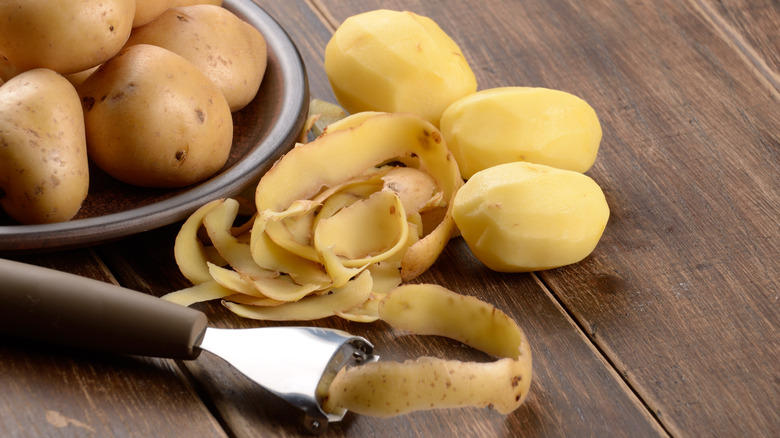Fix Overly Salty Soup With One Simple Potato Hack
Some people like their food salty, and there's nothing wrong with that. But it's one thing to add more salt because you want to, and another thing to do it unintentionally. Don't fret, though. Such things happen all the time. If your soup turned out too salty, you should be able to fix it without much fuss at all.
One option is to add potatoes or other starches to the mix. You can also dilute an overly salty soup with water or stir in some sour cream. Another piece of advice comes from Andrea Bemis, a published cookbook author. "If the dish already has a lot of root vegetables in it, cook some more in a separate pot of water — without any seasoning — and then add them to the broth, letting it simmer so the flavors even out," she told The Washington Post.
Not sure where to start? Head to the pantry and grab a potato or two. Most times, that's all you need to mask the saltiness of soups or other home-cooked meals, and the reason why this trick works has to do with the carbohydrates in the potato.
How the humble potato can fix an overly salty soup
If, for some reason, your soup is too salty, peel a potato and place it in the pot. Cook it along with the soup for 20 to 30 minutes or until tender, and then transfer it to a plate. Do the same to fix oversalted stews or sauces. Potatoes and other starches will absorb water and reduce the amount of salt in food. Nik Sharma, a best-selling cookbook author, recommends wrapping the potatoes in cheesecloth so you can remove them from the pot more easily.
Rice, pasta, barley, oats, and other starchy foods will yield similar results. "Any good starch will suck out the excess salinity," Sharma told The Washington Post. The downside is that they may alter the flavor or texture of your dish. For example, rice or pasta will release starch into the water and make your soup thicker. Therefore, you'd be better off using them to fix a runny soup rather than reduce saltiness. Potatoes release starch during cooking, too, but to a lesser extent. You can also replace any liquid absorbed by the spud with broth or water, diluting the salt content even further.
And in case you needed more convincing, it turns out that this potato hack is favored by legendary chef Wolfgang Puck, who notes that using cubes of potato will speed up the process but cautions that the chopped tubers might disintegrate. Another culinary icon, Martha Stewart, also endorses the tip.
Try these hacks to avoid oversalting your soup
The best thing you can do is prevent your food from getting too salty in the first place. For starters, consider tasting the soup at different stages of cooking. Canned tomatoes, soy sauce, and other ingredients are often high in sodium, so you may not need to use extra salt. Alternatively, switch to low-sodium broths and canned veggies with no salt added.
Another option is to add just a pinch of salt and then generous amounts of basil, parsley, thyme, or other herbs. A good example is this hearty onion soup with bacon and winter herbs, such as bay leaves, sage, and rosemary. The recipe calls for smoked bacon, which is high in sodium; therefore, you don't need to add sea salt.
If you're trying to cut back on sodium, switch to a salt substitute. For instance, green salt has about half the sodium content of table salt. Its strong umami flavor is a perfect match for laksa, fish soups, and vegetable soups. You can also swap salt for sodium-free spices like garlic or onion powder, smoked paprika, grated ginger, or red pepper flakes, depending on what other ingredients you add to your soup.


